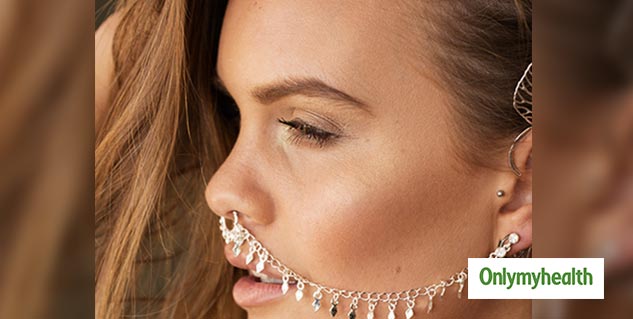
Nose piercings have become a popular form of self-expression, but before you take the plunge, it’s essential to understand the potential side effects. While a nose piercing can enhance your aesthetic, it also comes with some risks. In an exclusive interaction with the editorial team of Onlymyhealth, Dr Shrey Kumar Srivastav, Senior Consultant, Sharda Hospital - Noida, explained what you should know before getting your nose pierced. Here is what he shared with us.
Table of Content:-
1. Pain and Swelling
It’s normal to experience pain and swelling immediately after getting your nose pierced. The level of discomfort varies from person to person, but you should expect tenderness in the first few days. Over-the-counter pain relievers and a cold compress can help manage the swelling.
2. Infection
One of the most common complications of nose piercings is infection. Bacteria can enter the piercing site, leading to redness, swelling, pus, and pain. To prevent infection, follow your piercer’s aftercare instructions diligently, clean the piercing with saline solution, and avoid touching it with unwashed hands.

Also Read: From Desk to Diseases, Here’s How Sitting For Long Hours Can Harm Your Health
3. Keloids and Hypertrophic Scars
Some people are prone to keloids or hypertrophic scars, which are raised, thickened areas of skin that develop around the piercing. These can be difficult to treat and may require medical intervention. If you have a history of keloids, consult with a dermatologist before getting pierced.
4. Nasal Trauma
Accidentally bumping or pulling on your nose piercing can lead to irritation, bleeding, or even tearing of the skin. Be mindful when changing clothes, drying your face, or engaging in activities where your nose could get hit.
5. Allergic Reactions
Some people are allergic to certain metals used in nose piercings, such as nickel. If you have sensitive skin, opt for hypoallergenic materials like titanium, surgical steel, or gold to minimise the risk of irritation and allergic reactions.

6. Prolonged Healing Time
Nose piercings can take anywhere from two to six months to heal, and sometimes even longer if not properly cared for. Factors such as improper aftercare, frequent touching, and using the wrong jewellery can prolong the healing process.
7. Nasal Congestion and Discomfort
Some people experience increased nasal congestion or discomfort while their piercing is healing. This may be due to swelling or irritation, especially if you have allergies or frequently blow your nose.
Bottomline
While a nose piercing can be a beautiful addition to your look, being aware of the potential side effects is crucial. Proper aftercare and choosing a reputable piercer can significantly reduce risks and ensure a smooth healing process. If you experience severe pain, persistent swelling, or signs of infection, seek medical advice promptly. With the right precautions, you can enjoy your nose piercing safely.
Also watch this video
How we keep this article up to date:
We work with experts and keep a close eye on the latest in health and wellness. Whenever there is a new research or helpful information, we update our articles with accurate and useful advice.
Current Version